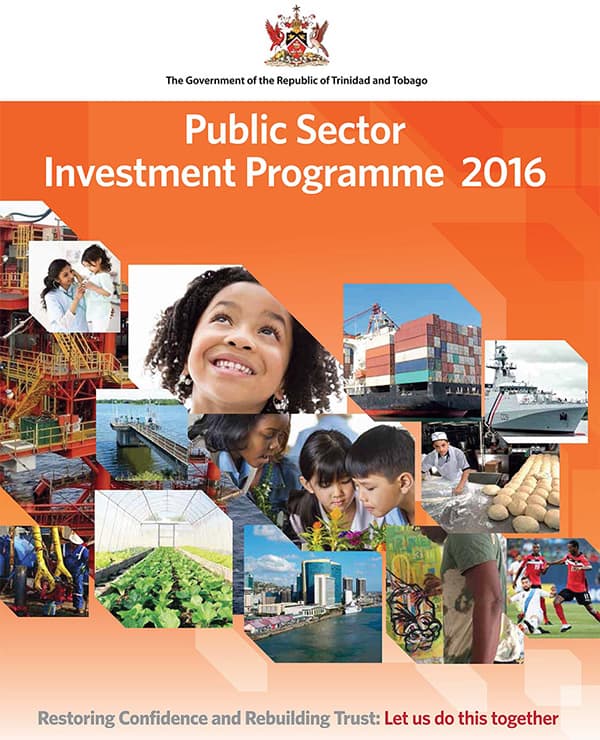
Above: The cover of the Public Sector Investment Programme document that will, among other things, drive technology initiatives for 2016.
BitDepth#1010 for October 13, 2015
Like most of Trinidad and Tobago, I reviewed the budget statement of the Minister of Finance, Colm Imbert with great interest.
Everyone expects every budget to address all the critical needs in their area of interest.
I hope to see technology represented somewhere in government’s priorities. I continue to be disappointed.
Now there are good reasons to cut Mr Imbert some slack. The incoming government had only weeks to put their stamp on the ongoing business of the state and to reflect those priorities in a budget statement.
A budget statement is, of course, not the budget at all. It’s a broad overview of financial allocations – and therefore a relative emphasis – that represents what the sitting government intends to do with the public’s money over the next year.
What’s actually going to happen is to be found in the hundreds of pages of supporting documents that represents the actual engine of public sector implementation and that’s not so easily meddled with.
Given these parameters, a budget statement, particularly one delivered in the circumstances which governed Mr Imbert’s contribution, is more likely to be confusing and unsatisfying than it is to deliver the boundary shots that so excite both financial observers and the man-in-the-street looking out for a direct impact on his pocket.
So we had the finance Minister’s promise of a “first-world information technology network” for the International Finance Centre, immediately followed by the “implementation of a national broadband network” and a promised collaboration “with the World Bank Group to widen our broadband infrastructure.”
That was briskly followed by a promise to equip schools with “a technological capability with adequate training for our teachers,” “free and easy access in all schools to fast broadband internet,” for students and “a free national public broadband wireless network beginning with free hotspots in popular areas.”
No, I have no idea what any of that actually means or how it’s likely to be manifested in practical execution, because there’s little in the Public Sector Investment Programme (PSIP) document that explains any of that in isolation.
Given that the 2016 PSIP is essentially the three-year action plan for planned public sector implementation and the rather grim reality that there are projects loitering in that document since the 2004 Fast Forward initiative, more incisive highlighting of key projects that the PNM Government intends to push to the front burner for early attention would have been welcome in the 2015-2016 budget, but again, lets cut the new Finance Minister some slack.
After all, the budget statement is an allocation and promise of attention, not the final word on what one hopes will be a year’s effort in serious reevaluating the public sector technology agenda in T&T.
What the country needs is not the active attention of the Cabinet on the technical specifications of CCTV surveillance systems for homes, but a systematic evaluation of the sprawling slate of technology activities that have been undertaken over the last ten years, most of which are still in the planning and pre-implementation stages. Even those which have been brought to apparent completion remain full of frustrating gaps.
Once a public sector project is announced as complete, with all the attendant launch hoopla and political stripmining for public accolades, it tends to be left to its own devices, but that’s not how technology projects work.
Even a project like ttConnect, which has moved many documents out of government offices to the Internet remains frozen in its earliest implementation and promised improvements and feature upgrades have been slow in coming. Glacially slow.
If anyone in the current Cabinet thinks that a project like Versadex, the planned technology for police officers can be launched like an acquisition of squad cars and motorcycles and considered done, they are in for a rude and startling surprise.
Versadex will demand a major investment in training, massive technology upgrades across the entire police service and pretty much the whole term of the current government to drive into practice. And that’s a project that can be readily understood by the general public.
So no, there isn’t much low-hanging tech fruit to be found in the current edition of the PSIP.
Coming to grips with the sprawl of partially completed projects, partially abandoned plans and rapidly ageing studies that the agencies of the public sector have been amassing over the last ten years probably is beyond the capacity of anyone in Cabinet.
Fortunately, this government seems keen to bring together subject matter experts in a consultative capacity to bolster its own talents.
I submit that technology is one area that desperately needs that type of professionally-led guidance.


Hey there, just dropping a line to point out a minor correction in the article..it’s ‘ttconnect’, not ‘ConnectTT’. Thanks much! :-)
Corrected. Thanks for the catch.
You’re most welcome. :-)